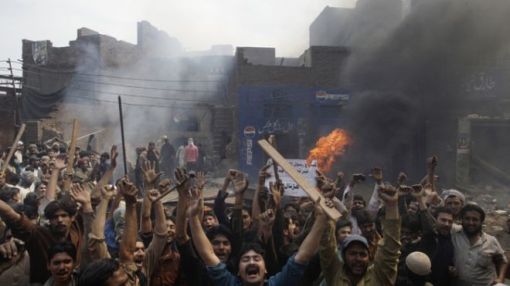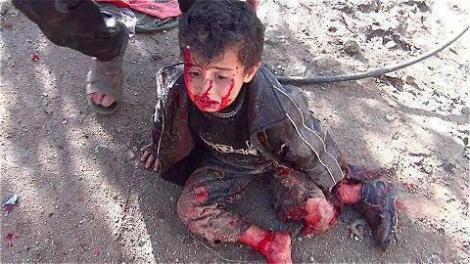Ten million dollars does not seem to buy much in this bustling Pakistani city. That is the sum the United States is offering for help in convicting Hafiz Muhammad Saeed, perhaps the country’s best-known jihadi leader. Yet Mr. Saeed lives an open, and apparently fearless, life in a middle-class neighborhood here.
“I move about like an ordinary person — that’s my style,” said Mr. Saeed, a burly 64-year-old, reclining on a bolster as he ate a chicken supper. “My fate is in the hands of God, not America.”
Mr. Saeed is the founder, and is still widely believed to be the true leader, of Lashkar-e-Taiba, the militant group that carried out the 2008 attacks in Mumbai, India, in which more than 160 people, including six Americans, were killed. The United Nations has placed him on a terrorist list and imposed sanctions on his group. But few believe he will face trial any time soon in a country that maintains a perilous ambiguity toward jihadi militancy, casting a benign eye on some groups, even as it battles others that attack the state.
Mr. Saeed’s very public life seems more than just an act of mocking defiance against the Obama administration and its bounty, analysts say. As American troops prepare to leave Afghanistan next door, Lashkar is at a crossroads, and its fighters’ next move — whether to focus on fighting the West, disarm and enter the political process, or return to battle in Kashmir — will depend largely on Mr. Saeed.
At his Lahore compound — a fortified house, office and mosque — Mr. Saeed is shielded not only by his supporters, burly men wielding Kalashnikovs outside his door, but also by the Pakistani state. On a recent evening, police officers screened visitors at a checkpoint near his house, while other officers patrolled an adjoining park, watching by floodlight for intruders.
His security seemingly ensured, Mr. Saeed has over the past year addressed large public meetings and appeared on prime-time television, and is now even giving interviews to Western news media outlets he had previously eschewed.
He says that he wants to correct “misperceptions.” During an interview with The New York Times at his home last week, Mr. Saeed insisted that his name had been cleared by the Pakistani courts. “Why does the United States not respect our judicial system?” he asked.
Still, he says he has nothing against Americans, and warmly described a visit he made to the United States in 1994, during which he spoke at Islamic centers in Houston, Chicago and Boston. “At that time, I liked it,” he said with a wry smile.
During that stretch, his group was focused on attacking Indian soldiers in the disputed territory of Kashmir — the fight that led the military’s Inter-Services Intelligence Directorate to help establish Lashkar-e-Taiba in 1989. But that battle died down over the past decade, and Lashkar began projecting itself through its charity wing, Jamaat-ud-Dawa, which runs a tightly organized network of hospitals and schools across Pakistan.
The Mumbai attacks propelled Lashkar-e-Taiba to notoriety. But since then, Mr. Saeed’s provocations toward India have been largely verbal. Last week he stirred anger there by suggesting that Bollywood’s highest-paid actor, Shah Rukh Khan, a Muslim, should move to Pakistan. In the interview, he said he prized talking over fighting in Kashmir.
“The militant struggle helped grab the world’s attention,” he said. “But now the political movement is stronger, and it should be at the forefront of the struggle.”
Pakistan analysts caution that Mr. Saeed’s new openness is no random occurrence, however. “This isn’t out of the blue,” said Shamila N. Chaudhry, a former Obama administration official and an analyst at the Eurasia Group, a consulting firm. “These guys don’t start talking publicly just like that.”
What it amounts to, however, may depend on events across the border in Afghanistan, where his groups have been increasingly active in recent years. In public, Mr. Saeed has been a leading light in the Defense of Pakistan Council, a coalition of right-wing groups that lobbied against the reopening of NATO supply routes through Pakistan last year. More quietly, Lashkar fighters have joined the battle, attacking Western troops and Indian diplomatic facilities in Afghanistan, intelligence officials say.
The question now is what will happen to them once American troops leave. One possibility is a return to Lashkar’s traditional battleground of Kashmir, risking fresh conflict between nuclear-armed Pakistan and India.
But a more hopeful possibility, floated by some Western and Pakistani officials, is that Mr. Saeed would lead his group further into politics, and away from militancy.
“When there are no Americans in Afghanistan, what will happen?” said Mushtaq Sukhera, a senior officer with the Punjabi police who is running a fledgling demobilization program for Islamist extremists. “It’s an open question.”
A shift could be risky for Mr. Saeed: Some of his fighters have already split from Lashkar in favor of other groups that attack the Pakistani state. And much will depend on the advice of his military sponsors.
For their part, Pakistan’s generals insist they have abandoned their dalliance with jihadi proxy groups. In a striking speech in August, the army chief, Gen. Ashfaq Parvez Kayani, said the country’s greatest threat came from domestic extremism. “We as a nation must stand united against this threat,” he said. “No state can afford a parallel system of governance and militias.”
Five years of near-continuous battle against the Pakistani Taliban along the Afghan border, where more than 3,300 members of Pakistan’s security forces have been killed in the past decade, has affected army thinking, some analysts believe. Senior officers have lost colleagues and relatives, softening the army’s singular focus on India.
“This is a changed army,” said Shaukat Javed, a former head of the Intelligence Bureau civilian spy agency in Punjab Province. “The mind-set has changed due to experience, and pressure.”
But for all that, there is ample evidence that parts of the military remain wedded to jihadi proxies. In Waziristan, the army maintains close ties to the Haqqani Network, a major player in the Afghan insurgency. In western Baluchistan Province, it has used Sunni extremists to quell an uprising by Baluch nationalists — even though the same extremists also massacre minority Shiites.
And Mr. Saeed’s freedom to roam around Lahore — and, indeed, across Pakistan — suggests some generals still believe the “good” jihadis are worth having around.
Western intelligence officials say Lashkar’s training camps in northern Pakistan have not been shut down. One of those camps was the training ground of David C. Headley, an American citizen recently sentenced to prison by an American court for his role in the Mumbai attacks.
“There’s a strategic culture of using proxies,” said Stephen Tankel, an American academic and author of a book on Lashkar-e-Taiba. “And if that’s the tool you’re used to grabbing from the toolbox, it can be hard to let go.”
For all his apparent ease, Mr. Saeed has to walk a tightrope of sorts within the jihadi firmament. His support of the state puts him at odds with the Pakistani Taliban, which, he claims, are secretly supported by America and India — a familiar refrain in the right-wing media. “They want to destabilize Pakistan,” he said.
But that position leaves Mr. Saeed vulnerable to pressure from fighters within his own ranks who may still have Taliban sympathies. Western security officials say Lashkar has already suffered some defections in recent years..
“If he continues in this direction, the issue is how many people he can bring with him,” Mr. Tankel said.
But ultimately, he added, much depends on the Pakistani Army: “The army can’t dismantle these groups all at once, because of the danger of blowback. So for now they are putting them on ice. It’s too early to tell which way they will ultimately go.”



















You must be logged in to post a comment.